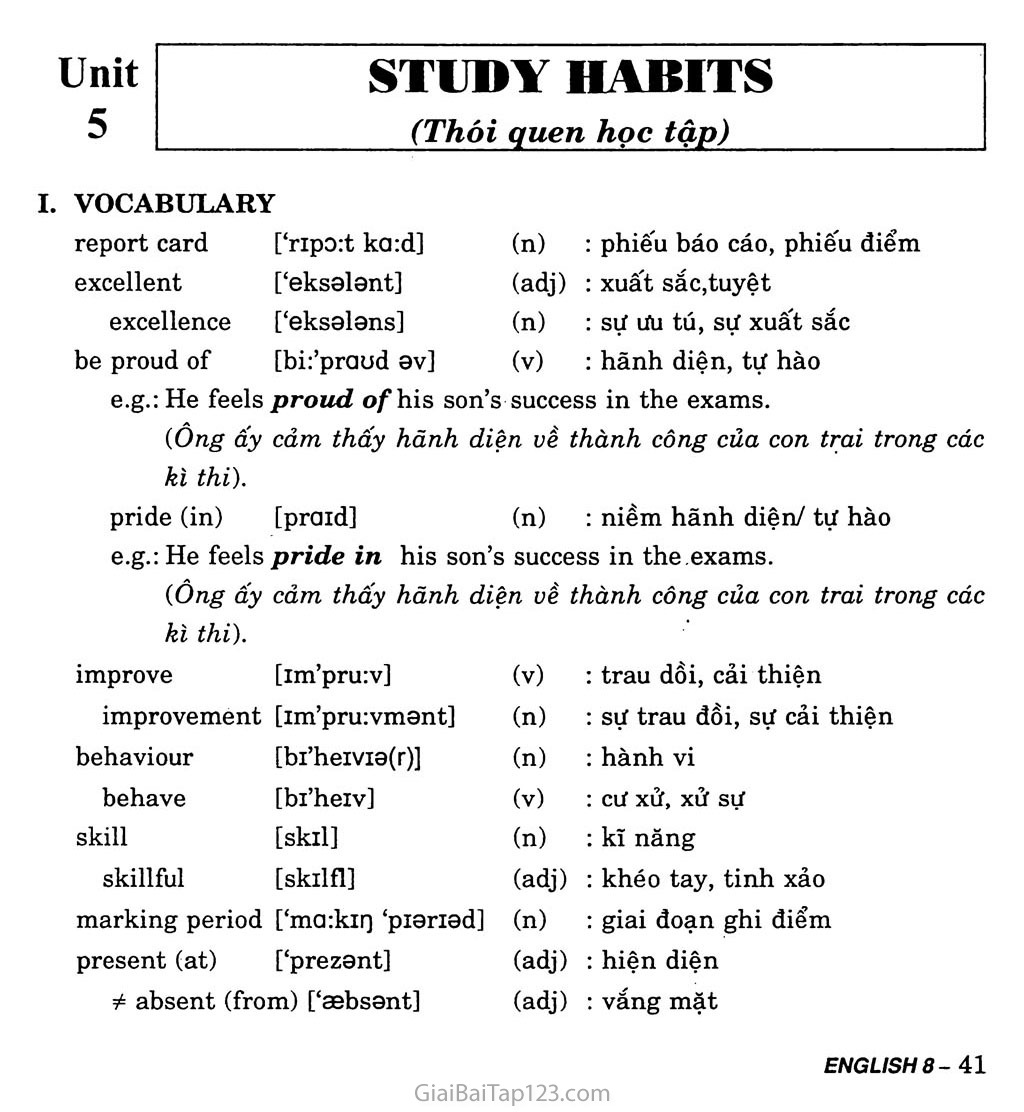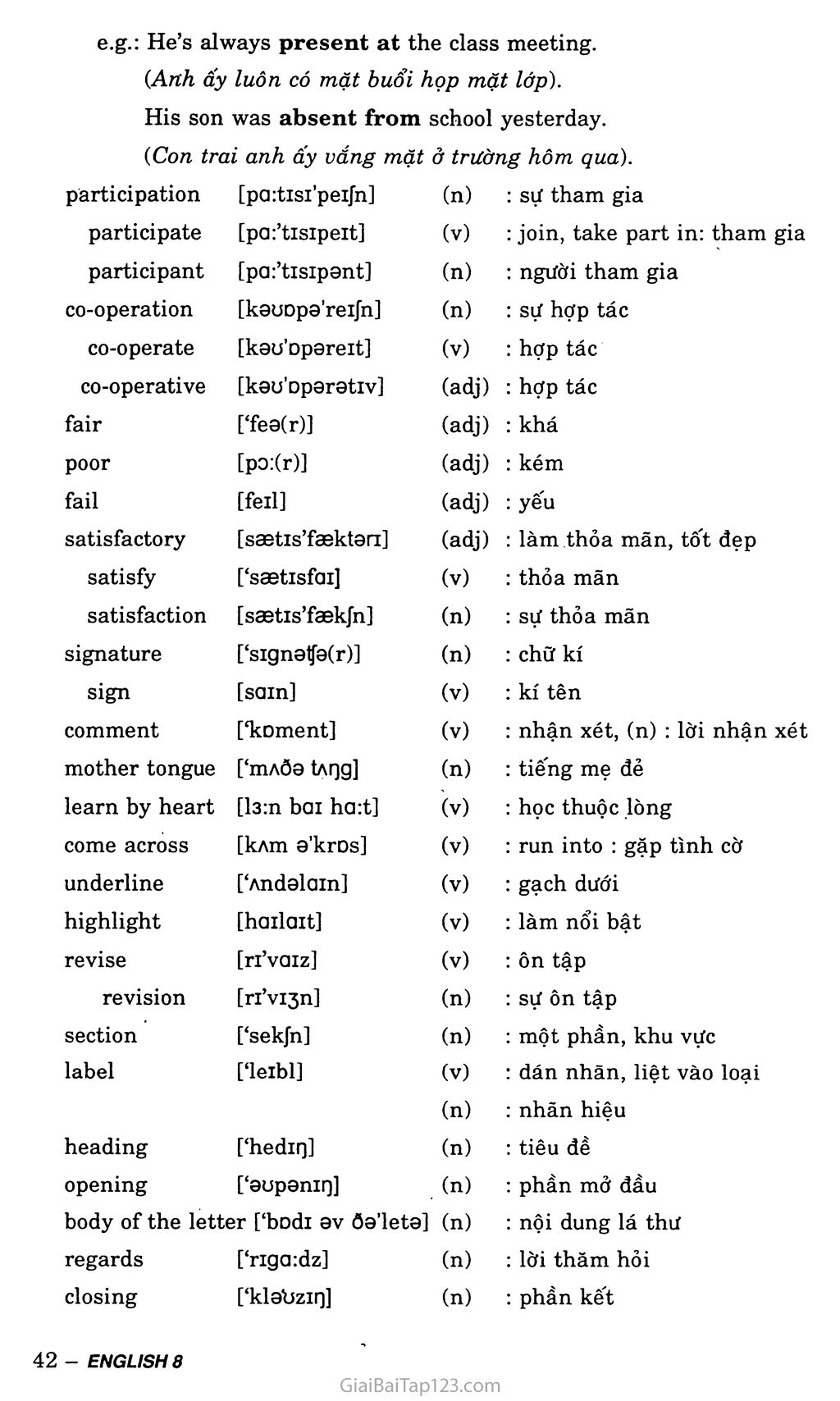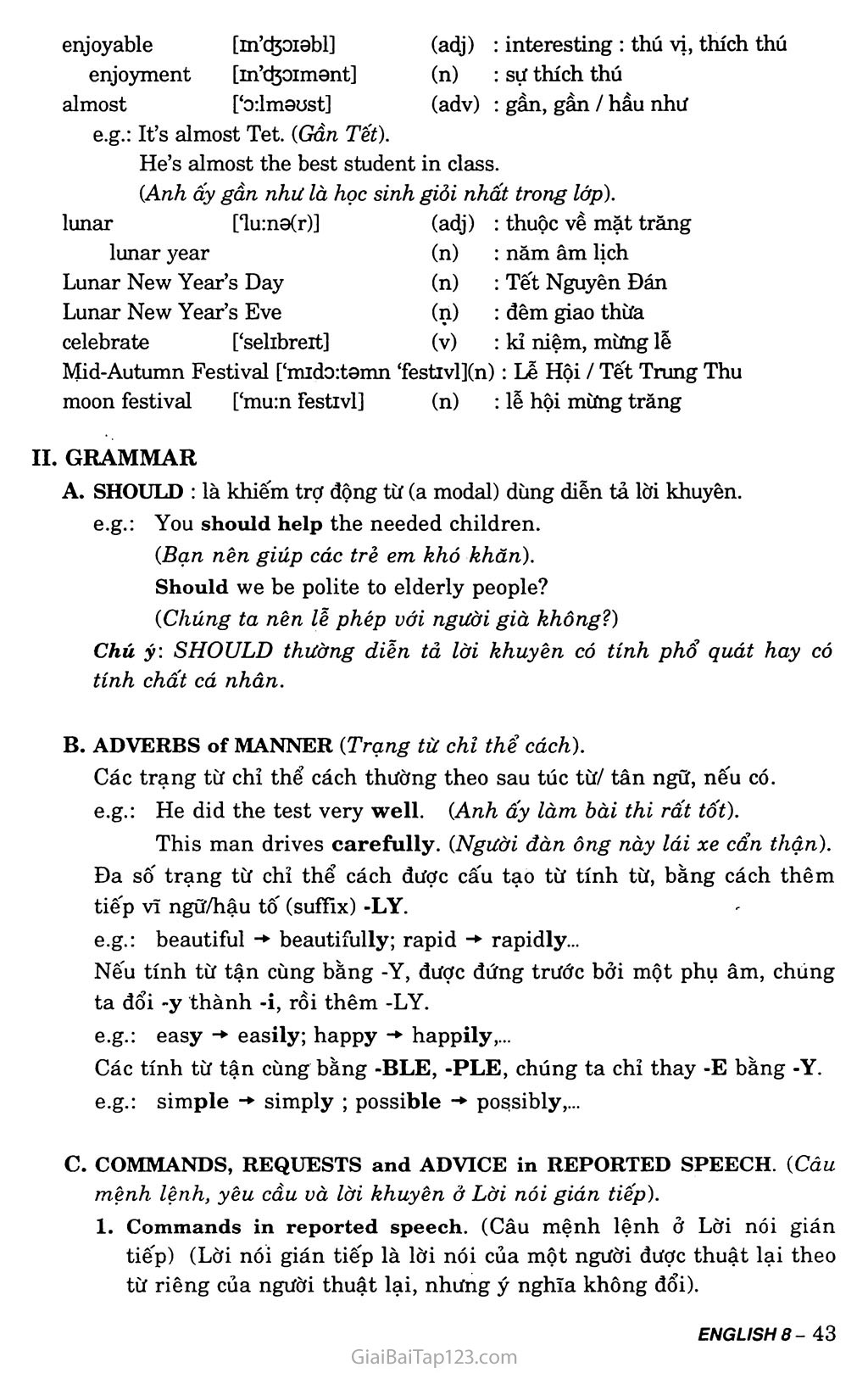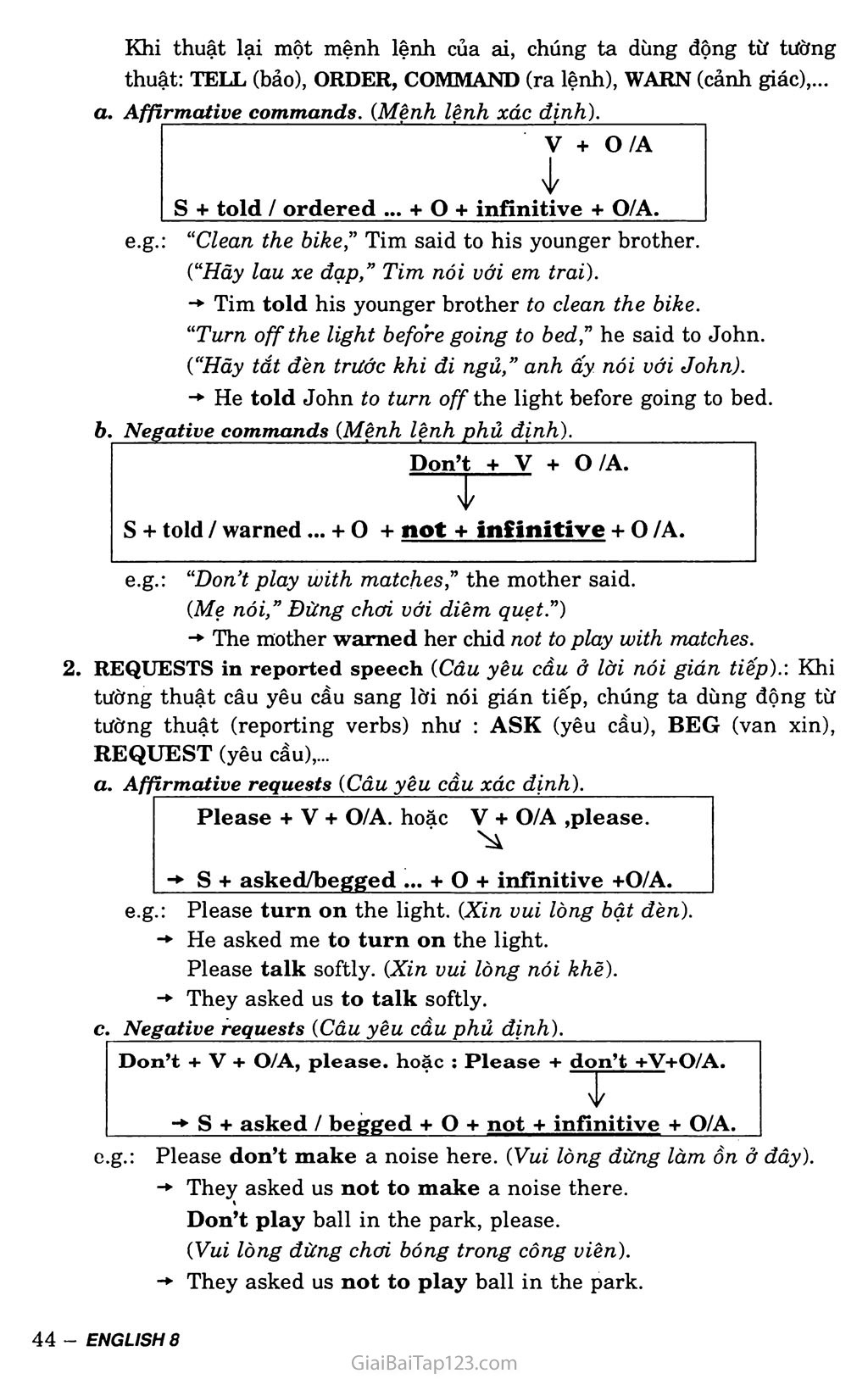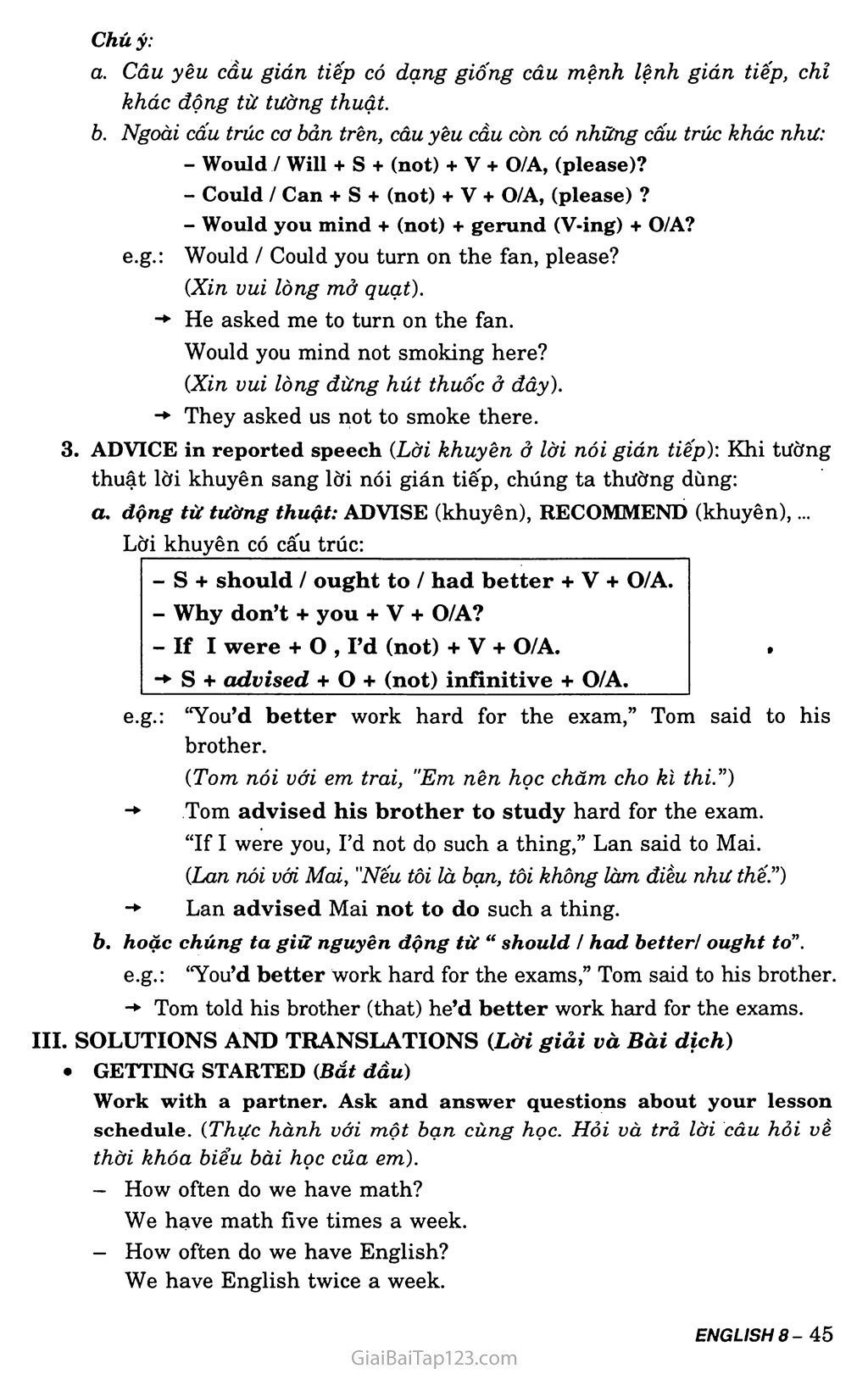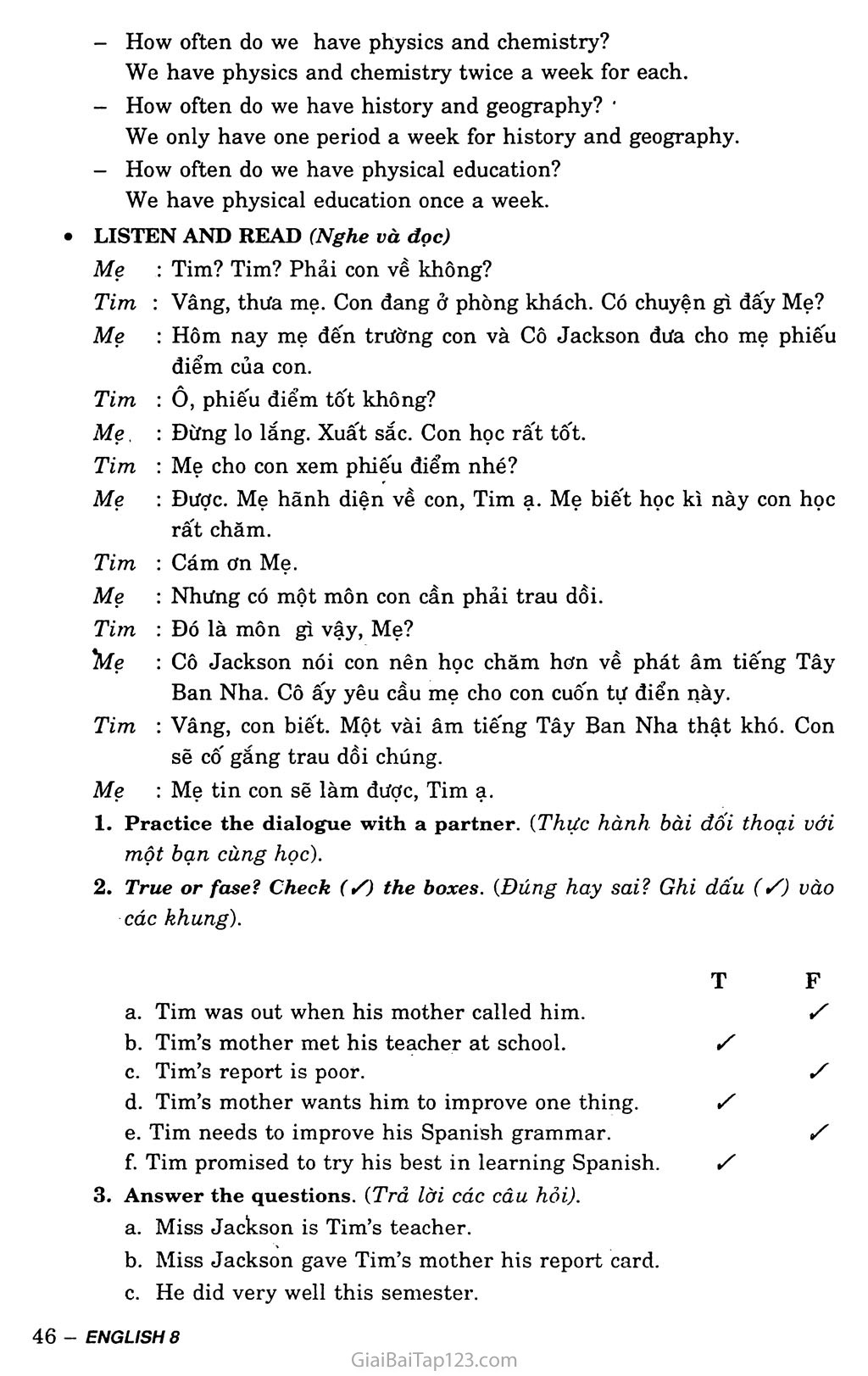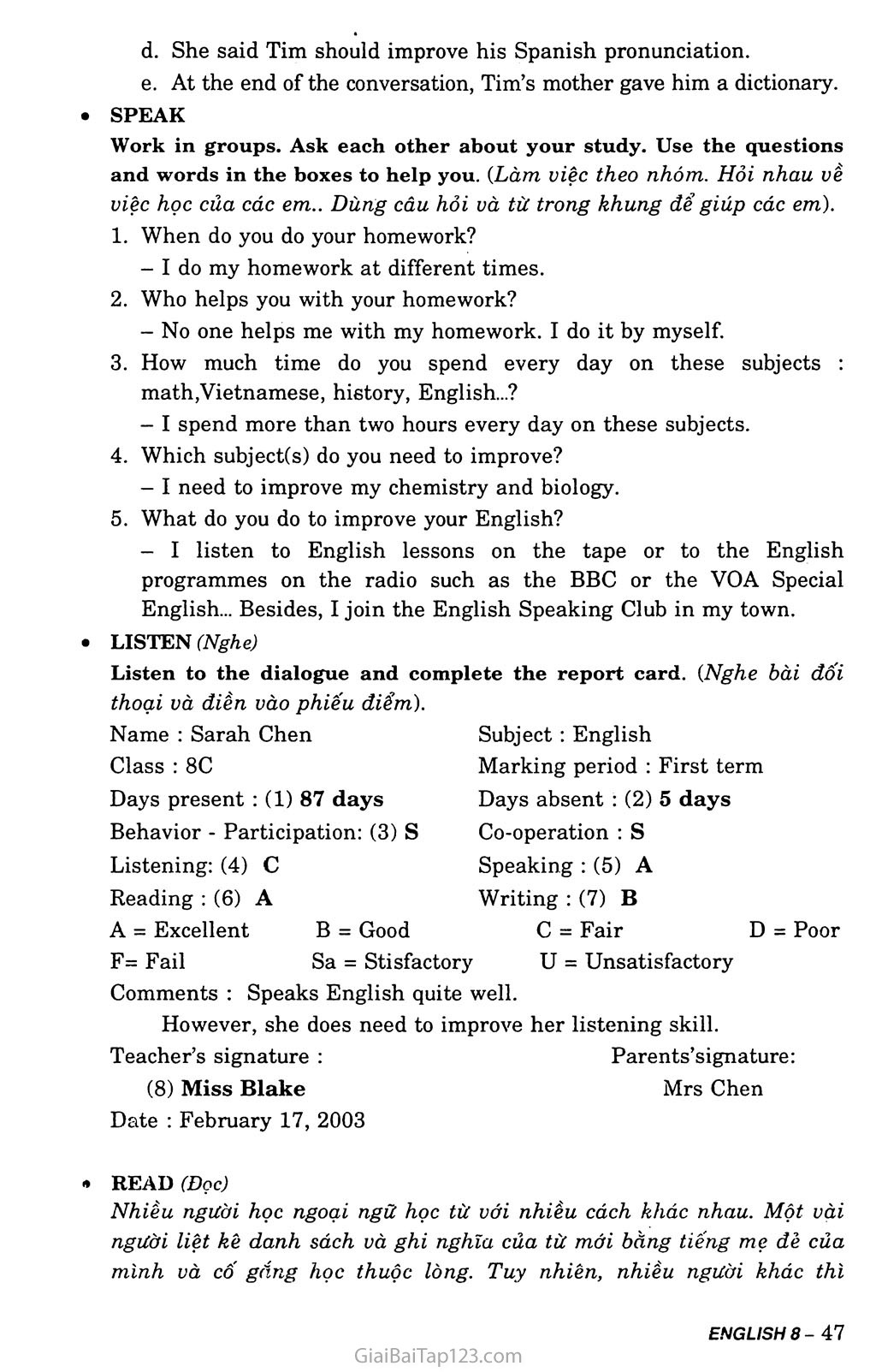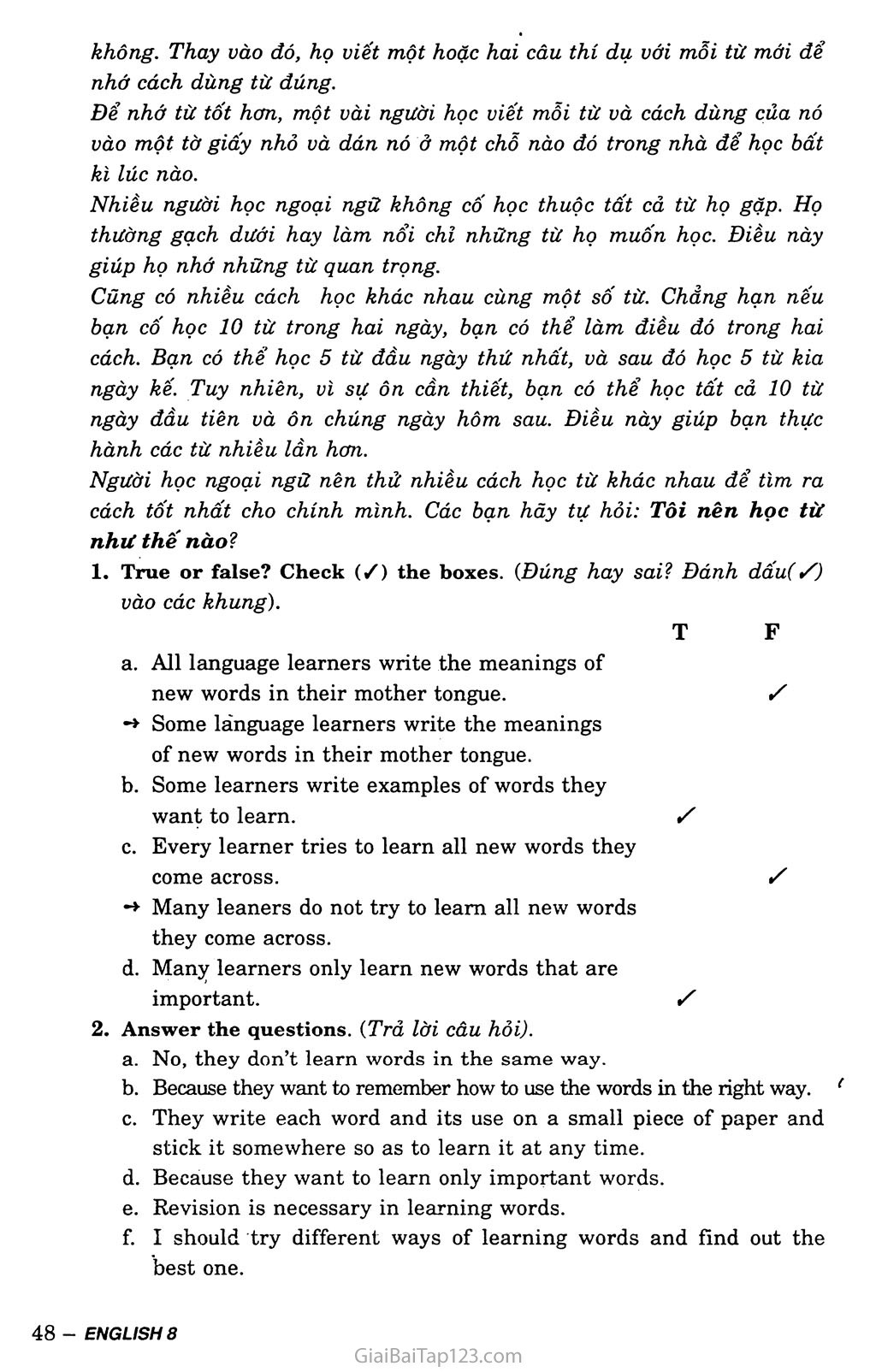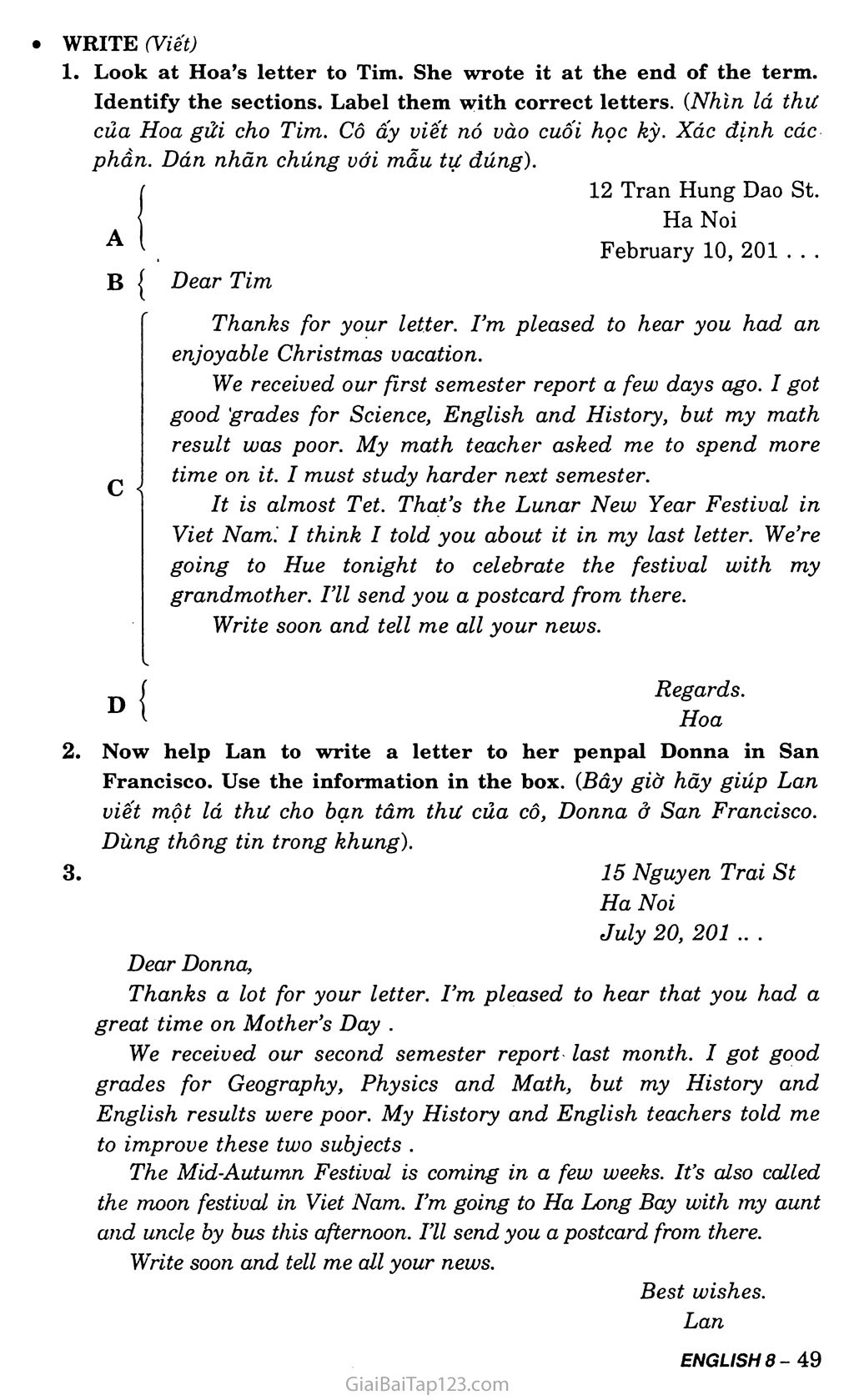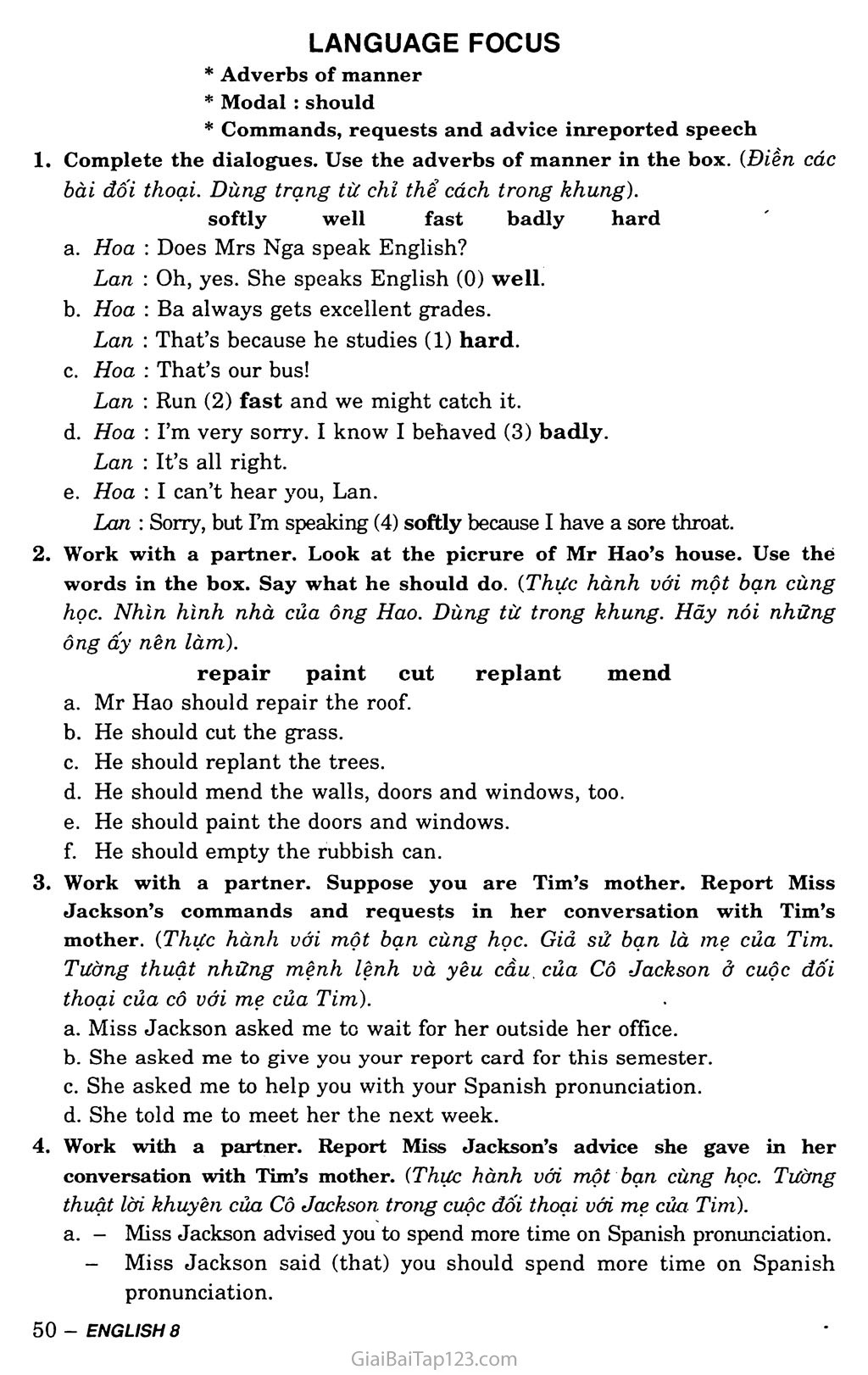Giải tiếng Anh lớp 8 Unit 5: Study Habits
Unit
5
STUDY HABITS
(Thói quen học tập)
I. VOCABULARY
report card
[‘ripo:t ka:d]
(n)
: phiếu báo cáo, phiếu điểm
excellent
[‘eksalont]
(adj)
: xuất sắc,tuyệt
excellence
[‘eksslans]
(n)
: sự ưu tú, sự xuất sắc
be proud of
[bifpraud 9v]
(v)
: hãnh diện, tự hào
e.g.: He feels proud of his son’s success in the exams.
{Ong ấy cảm thấy hãnh diện về thành công của con trai trong các
kì thi).
pride (in)
[praid]
(n)
niềm hãnh diện/ tự hào
e.g.: He feels pride in his son’s
success in the exams.
{Ông ẩy
cảm thấy hãnh diện về thành công của con trai trong
kì thi).
improve
[im’pru:v]
(v)
trau dồi, cải thiện
improvement [im’pru:vmsnt]
(n)
sự trau đồi, sự cải thiện
behaviour
[bi’heivi9(r)l
(n)
hành vi
behave
[bi’heiv]
(v)
cư xử, xử sự
skill
[skill
(n)
kĩ năng
skillful
[skilfl]
(adj)
khéo tay, tinh xảo
marking period [‘ma:kir) ‘pieried]
(n)
giai đoạn ghi điểm
present (at)
[‘prez9nt]
(adj)
hiện diện
± absent (from) [‘aebsant]
(adj)
vắng mặt
g.: He’s always present at the class meeting.
(Anh ấy luôn có mặt buổi họp mặt lớp).
His son was absent from school yesterday. (Con trai anh ấy váng mặt ở trường hôm qua).
participation
[pcntisi’peifn]
(n)
sự tham gia
participate
[paftisipeit]
(v)
join, take part in: tham gia
participant
[pa:’tisip9nt]
(n)
người tham gia
co-operation
[ksuopa'reifn]
(n)
sự hợp tác
co-operate
[k9ơ'Dp9reit]
(v)
hợp tác
co-operative
[ksu’Dpsrstiv]
(adj)
hợp tác
fair
[‘fea(r)]
(adj)
khá
poor
[po:(D]
(adj)
kém
fail
[fell]
(adj)
yếu
satisfactory
[saetis’faskten]
(adj)
làm thỏa mãn, tốt đẹp
satisfy
[‘ssetisfai]
(v)
thỏa mãn
satisfaction
[saetis’faekjn]
(n)
sự thỏa mãn
signature
[‘sign9t[9(r)]
(n)
chữ kí
sign
[sain]
(v)
kí tên
comment
[‘kDment]
(v)
nhận xét, (n) : lời nhận xét
mother tongue
[‘mA09 tArjg]
(n)
tiếng mẹ đẻ
learn by heart
[l3:n bai ha:t]
(v)
học thuộc .lòng
come across
[kAm 9’krDs]
(v)
run into : gặp tình cờ
underline
[‘And9lain]
(v)
gạch dưới
highlight
[hailait]
(v)
làm nổi bật
revise
[ri’vaiz]
(v)
ôn tập
revision
[ri’vi3n]
(n)
sự ôn tập
section
[‘sekfn]
(n)
một phần, khu vực
label
[‘leibl]
(v)
(n)
dán nhãn, liệt vào loại
nhãn hiệu
heading
[‘hedir)]
(n)
tiêu đề
opening
[‘gupgmrj]
(n)
phần mở đầu
body of the letter [‘bũdi 9V 09’let9]
(n)
nội dung lá thư
regards
[‘riga:dz]
(n)
lời thăm hỏi
closing
[‘klgbzir)]
(n)
phần kết
enjoyable
[m’cfeoiabl]
(adj) : interesting : thú vị, thích thú
enjoyment
[in’djoimant]
(n) : sự thích thú
almost
[‘odmaust]
(adv) : gần, gần / hầu như
e.g.: It’s almost Tet. {Gần Tết').
He’s almost the best student in class.
{Anh ấy gần như là học sinh giỏi nhất trong lớp).
lunar [dumafr)]
(adj)
: thuộc về mặt trăng
lunar year
(n)
: năm âm lịch
Lunar New Year’s Day
(n)
: Tết Nguyên Đán
Lunar New Year’s Eve
(n)
: đêm giao thừa
celebrate [‘selibreit]
(v)
: kỉ niệm, mừng lễ
Mid-Autumn Festival [‘mido:temn ‘festivl](n) : Lễ Hội / Tết Trung Thu moon festival [‘mum festivl] (n) : lễ hội mừng trăng
GRAMMAR
SHOULD : là khiếm trợ động từ (a modal) dùng diễn tả lời khuyên, e.g.: You should help the needed children.
{Bạn nên giúp các trẻ em khó khăn).
Should we be polite to elderly people?
{Chúng ta nền lễ phép với người già không'?)
Chú ỷ: SHOULD thường diễn tả lời khưyên có tính phổ quát hay có tính chất cá nhân.
ADVERBS of MANNER {Trạng từ chỉ thể cách).
Các trạng từ chỉ thể cách thường theo sau túc từ/ tân ngữ, nếu có. e.g.: He did the test very well. {Anh ấy làm bài thi rất tốt).
This man drives carefully. {Người đàn ông này lái xe cẩn thận). Đa số trạng từ chỉ thể cách được cấu tạo từ tính từ, bằng cách thêm tiếp vĩ ngữ/hậu tô' (suffix) -LY.
e.g.: beautiful -* beautifully; rapid -*■ rapidly...
Nếu tính từ tận cùng bằng -Y, được đứng trước bởi một phụ âm, chung
ta đổi -y thành -i, rồi thêm -LY.
e.g.: easy •+ easily; happy -* happily,...
Các tính từ tận cùng bằng -BLE, -PLE, chúng ta chỉ thay -E bằng -Y. e.g.: simple -* simply ; possible -» possibly,...
c. COMMANDS, REQUESTS and ADVICE in REPORTED SPEECH. {Câu mệnh lệnh, yêu cầu và lời khuyên ở Lời nói gián tiếp).
Commands in reported speech. (Câu mệnh lệnh ở Lời nói gián
tiếp) (Lời nóì gián tiếp là lời nói của một người được thuật lại theo từ riêng của người thuật lại, nhưng ý nghĩa không đổi).
Khi thuật lại một mệnh lệnh của ai, chứng ta dùng động từ tường thuật: TELL (bảo), ORDER, COMMAND (ra lệnh), WARN (cảnh giác),...
Affirmative commands. {Mệnh lệnh xác định). '
V + O/A
s + told Ị ordered ... + o + infinitive + O/A.
e.g.: “Clean the bike,” Tim said to his younger brother.
(“Hãy lau xe đạp,” Tim nói với em trai).
-*■ Tim told his younger brother to clean the bike.
“Turn off the light before going to bed," he said to John. (“Hãy tắt đèn trước khi đi ngủ,” anh ấy nói với John).
-► He told John to turn off the light before going to bed.
Negative commands (Mệnh lệnh phủ định).
Don’t + V + O/A.
s + told / warned... + o + not + infinitive + o /A.
e.g.: “Don’t play with matches,” the mother said.
(Mẹ nói,” Đừng chơi với diêm quẹt.”)
-*• The mother warned her chid not to play with matches.
2. REQUESTS in reported speech (Câu yêu cầu ở lời nói gián tiếp).-. Khi tường thuật câu yêu cầu sang lời nói gián tiếp, chúng ta dùng động từ tường thuật (reporting verbs) như : ASK (yêu cầu), BEG (van xin), REQUEST (yêu cầu),...
Affirmative requests (Câu yêu cầu xác định).
Please + V + O/A. hoặc V + O/A ,please.
Sa
-» s + asked/begged ... + o + infinitive +O/A. e.g.: Please turn on the light. (Xin vui lòng bật đèn).
-» He asked me to turn on the light.
Please talk softly. (Xin vui lòng nói khẽ).
-» They asked US to talk softly,
Negative requests (Câu yêu cầu phủ định).
Don’t + V + O/A, please, hoặc : Please + don’t +V+O/A.
ị
-» s + asked Ị begged + o + not 4- infinitive + O/A.
e.g.: Please don’t make a noise here. (Vui lòng đừng làm ồn ở đây).
-*■ They asked US not to make a noise there.
Don’t play ball in the park, please.
(Vui lòng đừng chơi bóng trong công viên).
-*■ They asked US not to play ball in the park.
Chú ý:
Câu yêu cầu gián tiếp có dạng giống câu mệnh lệnh gián tiếp, chỉ khác động từ tường thuật.
Ngoài cấu trúc cơ bản trên, câu yêu cầu còn có những cấu trúc khác như:
Would / Will + s + (not) + V + O/A, (please)?
Could / Can + s + (not) + V + O/A, (please) ?
Would you mind + (not) + gerund (V-ing) + O/A? e.g.: Would / Could you turn on the fan, please?
{Xin vui lòng mở quạt).
-*■ He asked me to turn on the fan.
Would you mind not smoking here?
{Xin vui lòng đừng hút thuốc ở đây).
-*■ They asked us not to smoke there.
3. ADVICE in reported speech {Lời khuyên ở lời nói gián tiếp)'. Khi tường thuật lời khuyên sang lời nói gián tiếp, chúng ta thường dùng:
а. dộng từ tường thuật: ADVISE (khuyên), RECOMMEND (khuyên),... Lời khuyên có cấu trúc:
s + should / ought to / had better + V + O/A.
Why don’t + you + V + O/A?
If I were + o , I’d (not) + V + O/A, .
-» s + advised + o + (not) infinitive + O/A.
e.g.: “You’d better work hard for the exam,” Tom said to his brother.
{Tom nói với em trai, "Em nên học chăm cho kỉ thi.'”)
•+ Tom advised his brother to study hard for the exam.
“If I were you, I’d not do such a thing,” Lan said to Mai.
{Lan nói với Mai, "Nếu tôi là bạn, tôi không làm điều như thế.”)
-* Lan advised Mai not to do such a thing.
б. hoặc chúng ta giữ nguyên động từ “ should / had better! ought to”. e.g.: ‘You’d better work hard for the exams,” Tom said to his brother. -* Tom told his brother (that) he’d better work hard for the exams.
SOLUTIONS AND TRANSLATIONS {Lời giải và Bài dịch)
• GETTING STARTED {Bắt đầu)
Work with a partner. Ask and answer questions about your lesson schedule. {Thực hành với một bạn cùng học. Hỏi vù trả lời câu hỏi về thời khóa biểu bài học của em).
— How often do we have math?
We have math five times a week.
- How often do we have English?
We have English twice a week.
How often do we have physics and chemistry?
We have physics and chemistry twice a week for each.
How often do we have history and geography? '
We only have one period a week for history and geography.
How often do we have physical education?
We have physical education once a week.
• LISTEN AND READ (Nghe và đọc)
Mẹ : Tim? Tim? Phải con về không?
Tim : Vâng, thưa mẹ. Con đang ở phòng khách. Có chuyện gì đấy Mẹ? Mẹ : Hôm nay mẹ đến trường con và Cô Jackson đưa cho mẹ phiếu
điểm của con.
Tỉm : 0, phiếu điểm tốt không?
Mẹ : Đừng lo lắng. Xuất sắc. Con học rất tốt.
Tim : Mẹ cho con xem phiếu điểm nhé?
Mẹ : Được. Mẹ hãnh diện về con, Tim ạ. Mẹ biết học kì này con học rất chăm.
Tim : Cám ơn Mẹ.
Mẹ : Nhưng có một môn con cần phải trau dồi.
Tim : Đó là môn gì vậy, Mẹ?
'Mẹ : Cô Jackson nói con nên học chăm hơn về phát âm tiếng Tây Ban Nha. Cô ấy yêu cầu mẹ cho con cuốn tự điển này.
Tim : Vâng, con biết. Một vài âm tiếng Tây Ban Nha thật khó. Con sẽ cố gắng trau dồi chúng.
Mẹ : Mẹ tin con sẽ làm được, Tim ạ.
Practice the dialogue with a partner. [.Thực hành bài đối thoại với một bạn cùng học).
True or fase? Check (S) the boxes. [Đúng hay sai? Ghi dấu (/) vào các khung).
T
F
a. Tim was out when his mother called him.
z
b. Tim’s mother met his teacher at school.
z
c. Tim’s report is poor.
z
d. Tim’s mother wants him to improve one thing.
z
e. Tim needs to improve his Spanish grammar.
z
f. Tim promised to try his best in learning Spanish.
z
3. Answer the questions. [Trả lời các câu hỏi).
Miss Jackson is Tim’s teacher.
Miss Jackson gave Tim’s mother his report card.
He did very well this semester.
She said Tim should improve his Spanish pronunciation.
At the end of the conversation, Tim’s mother gave him a dictionary. SPEAK
Work in groups. Ask each other about your study. Use the questions and words in the boxes to help you. {Làm việc theo nhóm. Hỏi nhau về việc học của các em.. Dùng câu hỏi và từ trong khung để giúp các em).
When do you do your homework?
I do my homework at different times.
Who helps you with your homework?
No one helps me with my homework. I do it by myself.
How much time do you spend every day on these subjects : math,Vietnamese, history, English...?
I spend more than two hours every day on these subjects.
Which subject(s) do you need to improve?
I need to improve my chemistry and biology.
What do you do to improve your English?
I listen to English lessons on the tape or to the English programmes on the radio such as the BBC or the VOA Special English... Besides, I join the English Speaking Club in my town.
LISTEN (Nghe)
Listen to the dialogue and complete the report card. (Nghe bài đồi thoại và điền vào phiếu điểm).
Subject : English
Marking period : First term Days absent : (2) 5 days Co-operation : s Speaking : (5) A Writing : (7) B
c = Fair D = Poor
u = Unsatisfactory
Name : Sarah Chen
Class : 8C
Days present : (1) 87 days Behavior - Participation: (3) s Listening: (4) c
Reading : (6) A
A = Excellent B = Good
F= Fail Sa = Stisfactory
Comments : Speaks English quite well.
However, she does need to improve her listening skill.
Teacher’s signature : Parents’signature:
(8) Miss Blake Mrs Chen
Date : February 17, 2003
- READ (Dọc)
Nhiều người học ngoại ngữ học từ với nhiều cách khác nhau. Một vài người liệt kê danh sách và ghi nghĩa của từ mới bằng tiếng mẹ đẻ của mình và cô' gắng học thuộc lòng. Tuy nhiên, nhiều người khác thì
không. Thay vào đó, họ viết một hoặc hai câu thí dụ với mỗi từ mới để nhớ cách dùng từ dũng.
Để nhớ từ tốt hơn, một vài người học viết mỗi từ và cách dùng của nó vào một tờ giấy nhỏ và dán nó ở một chỗ nào đó trong nhà để học bất kì lúc nào.
Nhiều người học ngoại ngữ không cố học thuộc tất cả từ họ gặp. Họ thường gạch dưới hay làm nổi chỉ những từ họ muốn học. Điều này giúp họ nhớ những từ quan trọng.
Cũng có nhiều cách học khác nhau cùng một số từ. Chẳng hạn nếu bạn cô' học 10 từ trong hai ngày, bạn có thể làm điều đó trong hai cách. Bạn có thể học 5 từ đầu ngày thứ nhất, và sau dó học 5 từ kia ngày kể. Tuy nhiên, vì sự ôn cần thiết, bạn có thể học tất cả 10 tù ngày đầu tiên và ôn chúng ngày hôm sau. Điều này giúp bạn thực hành các từ nhiều lần hơn.
Người học ngoại ngữ nên thử nhiều cách học từ khác nhau để tìm ra cách tốt nhất cho chính mình. Các bạn hãy tự hỏi: Tôi nên học từ
như thê nào?
True or false? Check (/) the boxes. (Đúng hay sai? Đánh dấu(X) vào các khung).
T F
All language learners write the meanings of
Answer the questions. (Trả lời câu hỏi).
No, they don’t learn words in the same way.
Because they want to remember how to use the words in the right way. (
They write each word and its use on a small piece of paper and stick it somewhere so as to learn it at any time.
Because they want to learn only important words.
Revision is necessary in learning words.
I should try different ways of learning words and find out the best one.
WRITE (Viết)
1.
Look at Hoa’s letter to Tim. She wrote it at the end of the term. Identify the sections. Label them with correct letters. (Nhìn lá thư của Hoa gửi cho Tim. Cô ấy viết nó vào cuối học kỳ. Xác định các phần. Dán nhãn chúng với mẫu tự đáng').
, í _ ~
B I Dear Tim
12 Tran Hung Dao St.
Ha Noi
February 10, 201 . . .
Thanks for your letter. I’m pleased to hear you had an enjoyable Christmas vacation.
We received our first semester report a few days ago. I got good grades for Science, English and History, but my math result was poor. My math teacher asked me to spend more time on it. I must study harder next semester.
It is almost Tet. That’s the Lunar New Year Festival in Viet Nam'. I think I told you about it in my last letter. We’re going to Hue tonight to celebrate the festival with my grandmother. I’ll send you a postcard from there.
Write soon and tell me all your news.
f Regards.
D I Hoa
Now help Lan to write a letter to her penpal Donna in San Francisco. Use the information in the box. (Bây giờ hãy giúp Lan viết một lá thư cho bạn tâm thư của cô, Donna ở San Francisco. Dùng thông tin trong khung).
15 Nguyen Trai St Ha Noi
July 20, 201 .. .
Dear Donna,
Thanks a lot for your letter. I’m pleased to hear that you had a great time on Mother’s Day .
We received our second semester report last month. I got good grades for Geography, Physics and Math, but my History and English results were poor. My History and English teachers told me to improve these two subjects .
The Mid-Autumn Festival is coming in a few weeks. It’s also called the moon festival in Viet Nam. I’m going to Ha Long Bay with my aunt and uncle by bus this afternoon. I’ll send you a postcard from there.
Write soon and tell me all your news.
Best wishes.
Lan
LANGUAGE FOCUS
Adverbs of manner
Modal : should
Commands, requests and advice inreported speech
Complete the dialogues. Use the adverbs of manner in the box. (Điền các bài đối thoại. Dùng trạng từ chỉ thể cách trong khung).
softly well fast badly hard
Hoa : Does Mrs Nga speak English?
Lan : Oh, yes. She speaks English (0) well.
Hoa : Ba always gets excellent grades.
Lan : That’s because he studies (1) hard.
Hoa : That’s our bus!
Lan : Run (2) fast and we might catch it.
Hoa : I’m very sorry. I know I behaved (3) badly.
Lan : It’s all right.
Hoa : I can’t hear you, Lan.
Lon : Sorry, but I’m speaking (4) softly because I have a sore throat.
Work with a partner. Look at the picrure of Mr Hao’s house. Use the words in the box. Say what he should do. (Thực hành với một bạn cùng học. Nhìn hình nhà của ông Hao. Dùng từ trong khung. Hãy nói những ông ấy nên làm.).
repair paint cut replant mend
Mr Hao should repair the roof.
He should cut the grass.
He should replant the trees.
He should mend the walls, doors and windows, too.
He should paint the doors and windows.
He should empty the rubbish can.
Work with a partner. Suppose you are Tim’s mother. Report Miss Jackson’s commands and requests in her conversation with Tim’s mother. (Thực hành với một bạn cùng học. Giả sử bạn là mẹ của Tim. Tường thuật những mệnh lệnh và yêu cầu của Cô Jackson ở cuộc đối thoại của cô với mẹ của Tim).
Miss Jackson asked me to wait for her outside her office.
She asked me to give you your report card for this semester.
She asked me to help you with your Spanish pronunciation.
She told me to meet her the next week.
Work with a partner. Report Miss Jackson’s advice she gave in her conversation with Tim’s mother. (Thực hành với một bạn cùng học. Tường thuật lời khuyên của Cò Jackson trong cuộc đối thoại với mẹ của Tim).
a. - Miss Jackson advised you to spend more time on Spanish pronunciation. - Miss Jackson said (that) you should spend more time on Spanish
pronunciation.
She advised you to practise speaking Spanish every day.
She advised you to listen to Spanish conversations on TV.
She advised you to practise reading aloud passages in Spanish.
She advised you to use a dictionary to find out how to pronounce Spanish words.

